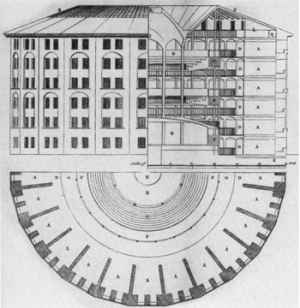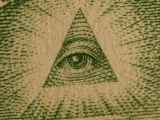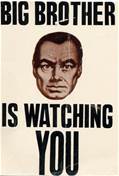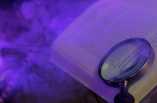Panopticons in Literature: Psychological Effects and Societal Allegories
Social theorist Jeremy Bentham’s original projection for a panoptic prison, made it so a prisoner never knew if he was being watched. A circular prison with a single guard tower in the middle was the original blueprint for the structure. The guard tower, manned by a single sniper, was hypothesized to be all it would take to manipulate the prisoners to be well-behaved.

Though there are no prisons that fit Bentham’s panopticon directly, around thirty prisons have cited architectural influence. The design of the panopticon fostered behavior modification based on the possibility of an omniscient guard. While historically and religiously, this behavior modification based on omniscience has been seen before, with the Egyptian all-seeing eye and several monotheistic texts referring an omniscient diety, 20th and 21st century literature has seen an increase in omniscient people and things. In the modern age, the panopticon has become an allegory for a loss of privacy particularly with modern conveniences like the internet and CCTV.
Psychological Effects of Panopticism
While the effects of living in Bentham’s panopticon have never been observed, since no such prison exists, the documentary Quiet: We Live in Public explored the reactions of living a life in the public sphere. 100 participants were filmed constantly in a house with numerous amenities. Contrary to Bentham’s hypothesized reaction, the participants did not become model citizens, but instead partook in extravagant and deviant behaviors knowing that they were being watched online. The difference is while the Quiet: We Live in Public experience sacrificed privacy willingly for the glamour of online fame and publicity, Bentham’s social experiment was to realign deviants with the correct path.
A similar experiment also documented in Quiet: We Live in Public, involving just Josh Harris and his partner in their living space discounted Bentham’s hypothesis. Despite knowing their every moment might be watched, both Harris and his partner acted in increasingly irrational ways and each had mental breakdowns. The sacrifice of their privacy led to their ultimate separation. In a similar vein, the TV show Big Brother has developed from the omniscient 1984 character “Big Brother”, showing a movement to adapt these literary themes and archetypes into reality, albeit an exaggerated one.
Before having the modern technology that enabled the panoptic possibilities, literature has predicted in dystopias the omniscient government or entity. 1984 had “Big Brother” and, more recently, The Hunger Games uses the arena as the panopticon being watched by all of the Districts. We are acutely aware that with the knowledge provided by the panopticon, that governments have power. They have the power to be omniscient, controlling, and silencing. President Snow knows that all eyes are on Katniss while she is in the arena and knows she is a symbol for the resistance. The President and the Gamemaker, much like Bentham’s sniper, manage the games from behind the scenes and take action to make an example of her and the other resisters.
The intricacy of the panopticon resides with the one-way dissemination of information. While the guard is able to see everything, the prisoner is unaware of if or when they are being watched. As in the examples in Quiet: We Live in Public the loss of privacy can lead to psychosis. While the literature does not directly demonstrate a correlation between the panopticons and turmoil, the loss of privacy and watchfulness of governmental bodies does cause unrest. The perversion of the government leads to a manipulation of society and a “weeding out” of the troublemakers or potential threats to the hierarchical order.
Eye Motif

As in ancient Egypt with the all-seeing eye, watchful eyes have reappeared throughout literature as the panopticon’s guard tower. The Great Gatsby showcases the eyes of the Dr. T. J. Eckleberg above George Wilson’s repair shop to be a witness to the climactic scenes of the book. While the optometrist is not mentioned except for having the billboard, the “eyes” watch over the most critical scenes and know all the truths.
In a relatively more recent book, Bad Monkeys, all eyes on posters, advertisements, etc. have the possibility to be projecting information to an omniscient spy-like organization. While most people are unaware of the eyes watching their every deed, Jane, the main character, and others like her in the spy-like organization of “Bad Monkeys” know that everything they do is being monitored, observed, and recorded. While the eyes are watching, Jane and the others try at times to manipulate what is being seen, hiding their true intentions.
As in Bad Monkeys, there are limitations on the scope of the panopticon. There are ways to hide it with blocking signals and false images. The panopticon trickery in Bad Monkeys is a metaphor that though the eyes are all-seeing, they can also be superficially deceived. As much as human eyes can be fooled with optical illusions and mirages, panopticon’s view can be obscured with deceitful behavior and false personas.
We Are Living in a Panopticon

The futuristic novel 1984 predicted a panoptic society with the idea of “Big Brother” as a figure of the omniscient dystopian government. While the idea of being observed, even in the comforts of our own homes was originally scoffed at, with new technology and new media, the parallels between our society and the Orwellian are even more striking.
In the age of the Patriot Act and the NSA monitoring scandal, we are acutely aware that we may be watched, yet not knowing if we are nevertheless makes us modify behavior. The reality of the millions of pieces of data all being observed is impossible, but knowing that our singular piece of information, whether it is an e-mail, a Facebook status update, a telephone conversation can be observed is not only a breach of privacy, but also a way of controlling what is out there.
Although Quiet: We Live in Public suggests that we wouldn’t modify our behavior even with the knowledge of being watched, there are other arguments that suggests the latter. The panopticon is a metaphor for being observed by a larger entity: God, government, etc. Interestingly enough, our role as the observed and the observer fluctuates based on the power we have in regards to other people.
What do you think? Leave a comment.











Aw man, We Live in Public. First of all this dude is a a microcosm of Citizen Kane. Brilliant, to some extent. Absolutely nuts, absolutely. The quiet scenes were as fascinating as they were horrifying. If you build it they will come. If you feed and clothe them they will stay. If you pressure them to do bizarre things for the interest of staying they will do them no matter how crazy. If you provide no order or structure they will destroy themselves. Quiet could have easily became a cult and that’s scary how easy it was.
I agree completely. Quiet is one of the most fascinating and horrifying things I have ever seen. I’m surprised that it’s so unknown. I only found out about it through watching this movie. It’s crazy what people will do just to be on camera or because something is free! The interrogation rooms were 100% terrible. Those rooms combined with the presence of guns and drugs makes me so surprised that something worse didn’t happen down there. It was a relief to see the cops shut them down.
On the other hand I sat and watched these people not knowing that everything was going to turn out okay in the end. What does that say about me?
Bad Monkeys was a true page turner for me (in every possible positive sense of that phrase). It was like Matt Ruff was channeling Neal Stephenson.
we live in public is interesting and totally biased. timoner made no pretense to downplay her idolizing of this man. a lot of the people interviewed just seemed like blind sychophants and zealots. oh well. the subject matter draws an audience.
I don’t see the bias at all. Ondi Timoner never states her feelings one way or another about the man. The fact that many people have stated he comes off as a psycho in this film shows that she didn’t portray him in a totally favorable light. She also never says he is a genius or anything like that. It is Josh Harris himself who claims to be “the first great artist of the 21st century.” All Ondi Timoner did with this film is document this guy’s life. Everything good and bad said about Josh Harris is said by other people. The fact that both good and bad things are said and shown makes me confused as to where the bias is coming from.
When I learned about the Panopticon in my methods class we discussed how “The Matrix” has similarities with the pantopticon. What are your thoughts on that?
Wow, I haven’t read Great Gatsby in a while, but when I was reading I thought the T.J. Eckleburg eyes were a really interesting part of the book. Sadly, at the time I didn’t know what it was about it that intrigued me so much. Learned something new today 🙂
First off— excellent article.
Now, I know that this piece is largely about the power that comes with information, the ability to acquire information and the illusion that an entity has information— and the influence that power has on the observed. But, it caused me to think about why it is that we so fear being “seen”—in a panoptic prison, the reason is obvious, in our day to day lives the reasons are less glaring.
Recently, I jotted down while on a walk, “My greatest fear isn’t death or torture—it is meeting an uncompassionate mind reader.”
Most of us are ashamed of parts of ourselves, or at least fear disapproval— that’s why we don’t want to be fully known. We fear the day when someone will discover how awful we really are.
For others it is a power and freedom issue— as you wrote “Our role as the observed and the observer fluctuates based on the power we have in regards to other people.” There is great reason for the power struggle in a prison. The prisoners have a desire— essentially, escape. But, because they can be seen by a guard with a gun, they will not act on their desires. The consequence would render the attempt useless. It wouldn’t be worth it.
However, there could be other times when a desire would be worth the potential consequences of a forbidden action. Say a man lived in a German town during WWII and knew that there were spies almost everywhere. Would the risk of hiding Jews in his home be greater? Yes. Would it be worth the risk? That is an entirely different question. The man must decide how great his desire is to save lives.
What happens next is a choice.
And that is where I lay my worry down.
When it comes to personal issues, if one is ashamed about a part of himself and his life because he knows it’s wrong— he should fix it. If he has a fear that others will disapprove of his convictions— he should stop placing his value in the opinions of others.
He should own up to who he is.
As for struggles of power— if potentially winning the battle is worth the fight, what is he sweating about? Get sneaky: “Be as sly as a serpent and as innocent as a dove.”
Anyway, those were my musings 🙂
Great article! Personally, I don’t feel bothered that the government watches me (although I feel like I’m supposed to be bothered) because even if they found out about something embarrassing I do, I can’t imagine what they’d do about it. And I don’t do anything notably illegal (I mean, I jaywalk…). They seem so irrelevant to me that I don’t think I modify my behavior for them.
That said, I have at times rewrote Facebook status’ to avoid cussing because I’m worried a potential employer could see it. Maybe it’s a bit paranoid, but that’s one area in which I do change my behavior.
I definitely feel the same way. I do worry about statuses, weed legalization pages I’ve liked, and other things affecting future employment. Keeping naked pictures off the Internet is a good idea for most people too, to avoid potential problems. But what could the government really do? If they wanna watch, let them watch! If I’m not doing anything illegal online, then I have no idea to feel paranoid. However, I do understand that some people have concerns, such as their medical information being collected and released to insurance companies, making it difficult to get coverage at an affordable cost. Some people just palin don’t like being spied on. I respect that. But I think most people are overly paranoid, and would be surprised how little the government cares about their conversations, provided that these conversations haven’t been flagged. I feel that what I do online is so boring, no NSA agent is going to be monitoring my posts. Maybe I’m wrong. Either way, it doesn’t matter in the long run to me personally.
Interesting how a panopticon has become, in ways, an archetype of humanity. In almost all cultures there is a religion with gods that can watch our behavior and reward or punish said behavior. In all literature and art there is an idea of an all-seeing entity. As I beleive art is a reflection of the human state of mind, I wonder what makes us believe so fervently in this all-seeing entity? Do we need such an entity to feel secure, or has that entity always been there and is not made up? Maybe it stems from being children, watched and controlled by our parents. We learned that even when we thought we were being sneaky, our parents usually had a clue what was going on. That revelation can be a little scary. Maybe this is what creates a need for this higher panoptical presence when we are adults, because we require the feeling of being guarded, watched, protected that we miss from childhood. And of course, we can make this desire a reality, by allowing our governments to be able to watch us and control us, or letting people such as jealous spouses watch and control our lives. Whether we go crazy or not is contingent upon our attitudes about being watched in such ways, which may stem from our experiences as children and how our parents handled us, our genetic propensity for mental illness, etc. This is just my theory on why panopticons are such a universal symbol known and feared yet cherished by all humans.
Interesting- the panopticon really does seem to have put people into a state of fear and paranoia. Even if the government is watching, unless you’re a highly sought for criminal, why would they care what YOU are doing? What is your true importance to the government? As long as you aren’t breaking major laws, there isn’t much they’re going to care to do. Anyone notice how many celebs are open about illegal drug use, yet not all of them have been tracked down for admission of the act on TV/posted videos of them committing the acts.
This symbol is certainly worth consideration and analysis in it’s stance in the minds of our society and its people, however there are literally so many people in the U.S. alone that it’s impossible to watch everyone at every moment. It’s much more likely that they would document peoples’ actions (to be stored in some sort of database, not being watched by creepy dudes) and keep it in store for a certain amount of time. Later on, should someone become a suspect in a crime, all they have to do is look up the persons’ recent history online and that could give them huge clues to the persons’ motives/whereabouts/next moves. It truly is and would be for our safety.
I was doing research on how the software era in which we’re living today bears resemblance to the idea of panopticon and found your argument quite on point. Except the fact that privacy and freedom were sought after by the the observed while today being exposed on social media and other platforms has become like a narcotic, by and large.
Things do have a different connotation in a different context.